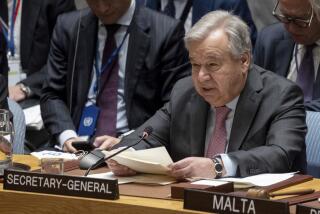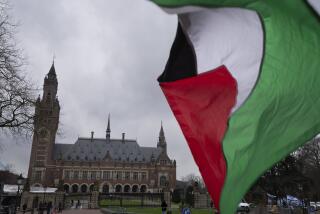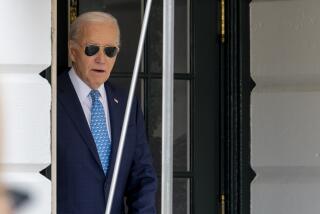Moscow Asks U.N. Slap at Israeli Policy on Soviet Jews : Immigration: Kremlin opposes settling newcomers in occupied areas. It admits pressure from Arab nations.
- Share via
MOSCOW — Faced with growing Muslim criticism that it is helping to drive Palestinians from their homes in the Israeli-occupied West Bank and Gaza Strip, the Soviet Union on Monday called for an urgent U.N. Security Council meeting to condemn Israel’s policy of settling Soviet Jewish immigrants there.
It also took the unusual step of calling on the United States to speed processing of applications from Soviet Jews who want to go to America so that more will have an alternative to Israel.
Speaking at a press conference, First Deputy Minister of Foreign Affairs Yuli M. Vorontsov called Israel’s practices “extremely serious” and said the Soviet Union hopes the Security Council will proceed with “the same degree of gravity” to take up the issue.
Israel expects 50,000 to 100,000 Soviet Jews to arrive this year and up to 750,000 in the next five or six years under Moscow’s liberalized emigration practices.
Israeli Prime Minister Yitzhak Shamir triggered widespread criticism last month when he said a “big Israel” is needed to accommodate the immigration wave. Aides tried to play down his remark, saying that he meant a “strong” Israel. But the term “big Israel” is commonly understood in that country to refer to the pre-1967 state plus the West Bank and Gaza Strip territories occupied after the 1967 Middle East War.
It is unclear how many Soviet Jews are actually settling in the occupied territories. Simcha Dinitz, chairman of the quasi-governmental Jewish Agency, said that for the 10 months ending at the end of last month, only 63 of 12,673 new immigrants had moved to the West Bank and Gaza Strip.
However, independent checks suggest that several hundred Soviet emigres have settled in the largest Jewish towns in the disputed territories, which are home to about 1.7 million Palestinian Arabs and 70,000 Jews. Also, some of the most prominent Soviet Jewish emigres have settled in the West Bank and are urging other newcomers to do the same.
On Monday, Israel’s immigration minister canceled a planned visit to Jewish settlements in the West Bank for fear of stirring up more controversy on the issue.
Vorontsov conceded that Moscow has come under pressure from Arab countries, some of which have urged it to stop Jewish emigration. Others urge that the Kremlin slow down the process of its rapprochement with Israel.
Last week, the 46-member Islamic Conference Organization accused both superpowers of helping drive Palestinians from their homes by their handling of the Soviet Jewish emigration issue.
Vorontsov said that Moscow is not about to reverse itself on emigration policy. “From now on,” he said, “any Soviet citizens who wish to leave the Soviet Union and resettle in other countries have ample opportunity to do so.”
“We’ve told our friends in Arab countries that our legislation will be in keeping with the legislation of their countries, too. They also have no restrictions and limitations regarding emigration and immigration, nor are we going to have any.”
It is up to Israel to reverse its settlement policy, Vorontsov said, calling it unlawful and a violation of the Geneva conventions. “We believe that in the context of Israel’s policy now, it is undesirable for the United States to delay the process of accepting immigrants from the Soviet Union to the United States,” he added.
The liberalized Soviet emigration policy has created an enormous influx of applications to go to the United States from many ethnic groups here, and Soviet Jews no longer get the same kind of preferential treatment they once did.
Vorontsov also conceded that widespread rumors here about impending anti-Semitic pogroms “prompt people to think about emigration even though otherwise they would never do that.” He pledged that “no pogroms will be allowed” and condemned those, including Israel, whom he accused of spreading unfounded rumors.
Moscow had been hoping that Washington would join it in an unusual joint statement condemning Israel’s settlement policies during the visit here last week of U.S. Secretary of State James A. Baker III. However, Baker said such a move would be unhelpful, and the Soviet Foreign Ministry issued a protest on its own.
Nevertheless, Washington has made clear its opposition to Israeli settlements, and Vorontsov said he does not believe that a Security Council resolution will pose “any insurmountable difficulties for the United States.”
More to Read
Sign up for Essential California
The most important California stories and recommendations in your inbox every morning.
You may occasionally receive promotional content from the Los Angeles Times.













